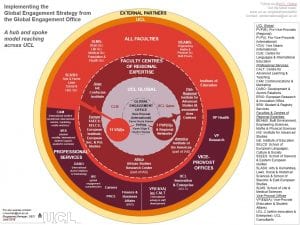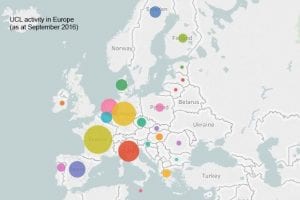UCL collaboration scoops Outstanding Research Team award in Zambia
By Sophie Vinter, on 14 November 2016
 A UCL Medical School collaboration with the University of Zambia has scooped a prestigious award in recognition of its equitable partnership model for conducting research into poverty-related diseases.
A UCL Medical School collaboration with the University of Zambia has scooped a prestigious award in recognition of its equitable partnership model for conducting research into poverty-related diseases.
The UNZA-UCLMS partnership, established by Professor Alimuddin Zumla (UCL Division of Infection and Immunity), won the Outstanding Research Team Award during the eighth European and Developing Countries Clinical Trials (EDCTP) Partnership Forum.
The President of the Republic of Zambia, Edgar Chagwa Lungu, presented the award and €50,000 prize money to members of the team.
The award was collected by Dr Peter Mwaba (former UCL PhD student of Professor Zumla), Dr Nathan Kapata (National Tuberculosis Programme Manager), Dr Aaron Shibemba, (Head of Pathology) and UCL Postdoctoral Scientists Dr Matthew Bates and Dr Jim Huggett.
Crossing disciplines and borders
Professor Zumla established the programme in 1994 with the Dean of the University of Zambia Medical School, Professor Chifumbe Chintu, as a novel model of academic partnership.
It would take forward African science away from domination by the North, instead championing the cause for fair and equitable North-South and South-South research, training and capacity development initiatives.
Since then the collaboration has linked 34 institutions from across West, Central, South and East Africa with 28 European institutions.
The partnership has led to training for numerous medical, scientific, nursing and laboratory personnel, capacity building for conducting clinical trials, and the development of valuable research infrastructure.
Prof Zumla said: “We are extremely proud, honoured and humbled to receive this prestigious award from the EDCTP. Success of complex multi-disciplinary, multi-institutional and multi-country educational, capacity development and research programmes is critically dependent on selfless, committed, and dedicated staff. This award acknowledges the exceptional contributions made over 23 years by my teams here at UCL and in Zambia in collaboration with all our partner institutions in Africa and Europe.”
Mutually beneficial
The collaboration was based on the principal that partnerships must engage all parties in a way that is mutually beneficial, and that all research must be twinned and aligned to local capacity development and training.
The team has made great headway in tackling poverty-related diseases over the years, achieving more than 500 publications, 20 textbooks and over 100 articles in The Lancet journals.
Its clinical trials, autopsy and translational research data have been used by the World Health Organization (WHO) and African governments for improving management and prevention of poverty-related diseases.
It brings together scientists, funders, politicians, and advocates to unite together in the fight against infectious diseases, particularly tuberculosis and HIV/AIDS, diseases declared global emergencies by the WHO in 1993.
 Close
Close





